Sunday, March 6th, 2022
LO6 Demonstrate engagement with issues of global significance Students are able to identify and demonstrate their understanding of global issues, make responsible decisions, and take appropriate action in response to the issue either locally, nationally or internationally.

On Sunday the 6th of March, my service group, Care for Paws held a sterilization and vaccination camp in the Sri Lankan Army Headquarters for stray dogs. This sterilization camp is supposed to be annual, however, it was cancelled for the past two years due to COVID. However, this Sunday, we were successful in hosting our camp. The purpose of this sterilization camp is to vaccinate and sterilize street dogs in Sri Lanka, control the street dog population, as well as to take care of and look out for the health and wellbeing of street dogs in Sri Lanka. This is an issue of global significance, as street animal abuse and overpopulation are predominant issues in many parts of the world; especially Sri Lanka. Care for Paws has taken appropriate action in response to this issue, locally; in the Sri Jayawardenapura Kotte Army Headquarters; where there is an abundance of street dogs. Over 30 dogs were sterilized, vaccinated and cared for during this camp, and 3 dogs were treated for ttb. Additionally, there was a c-section of 3 newborn puppies, all of who were healthy at the end of the camp.
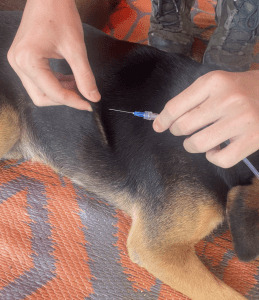
Care for Paws has taken action to try to mitigate this issue of street dog overpopulation by sterilizing the dogs and caring for them. To make sure that these street dogs were cared for after a very big surgery, long-term antibiotic injections were given to the dogs, so they could heal after surgery without infections, and get placed back into their homes. Myself and the other service group members in Care for Paws collaborated with the organizations Adopt-a-Dog Sri Lanka, and Vets for a Better Future to complete this sterilization camp. The Vets and Professionals from these organizations collected the street dogs and performed surgeries on the dogs; as well as vaccinated them.
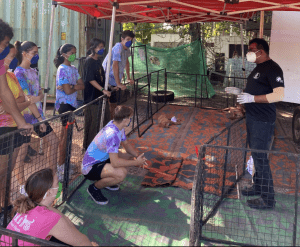
The service group members in Care for Paws spent the day – from 7:30 am to 4:00 pm – tending fir the dogs and doing the aftercare from the surgery. This included applying for tick and flea medicine on the dogs, keeping them calm, and comforted with petting and attention (as many are disoriented and confused after the surgeries), giving the dogs IVs and keeping them hydrated, checking on their breathing patterns to make sure they are healthy, giving them attention, and eventually feeding them food and water before they get released back to where they live.
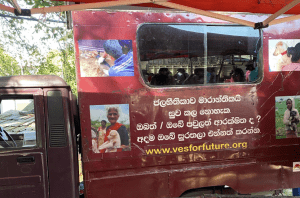
LO2 Demonstrate that challenges have been undertaken, developing new skills in the process A new challenge may be an unfamiliar experience or an extension of an existing one. The newly acquired or developed skills may be shown through experiences that the student has not previously undertaken or through increased expertise in an established area.
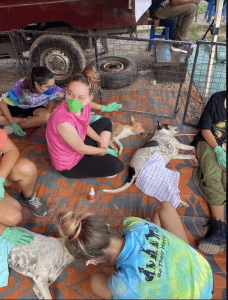
Personally, for me, this sterilization camp was a huge challenge. The week before this, I had been at home with dengue fever; which was really difficult for me and it took a long time to recover. On the day of the sterilization camp, I was not fully recovered yet, and it was the first time I had done anything since having dengue. I had a few dizzy spells and shortness of breath while I was there, so I had to take it easy. I have never attempted to care for or look after dogs while recovering, so this is an unconventional skill that I learned how to do. I also faced the challenge of trying to help street dogs by taking care of them. I learned how to inject dogs with IVs to keep them hydrated, and I also learned how to help newborn puppies survive, and the signs to look out for of bad health. I now have increased expertise in looking after and caring for dogs post-surgery.
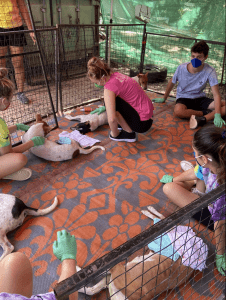
LO3 Demonstrate how to initiate and plan a CAS experience Students can articulate the stages from conceiving an idea to executing a plan for a CAS experience or series of CAS experiences. This may be accomplished in collaboration with other participants. Students may show their knowledge and awareness by building on a previous experience, or by launching a new idea or process.

This whole sterilization and vaccination camp was planned by our whole service group collaborating. With the help of our teacher supervisor, Ms. Francemone, we contacted and collaborated with the two dog organizations to organize and plan the sterilization camp. This originally took lots of time, as we had to get permission to get into the Sri Lankan Army Headquarters, as well as arrange the van and Vets for the camp. We also needed to organize roles and jobs for each member of the service group while at the camp – including photography, caring for dogs, caring for cats, note-keeping on how many/the sex of the dogs we treated, helping puppies, etc. We built our knowledge on our previous experiences with sterilization camps and we collaborated to execute a plan to have our Sterilization Camp; which was our CAS experience.
LO4 Show commitment to and perseverance in CAS experiences Students demonstrate regular involvement and active engagement in CAS.

This sterilization camp shows my personal commitment and perseverance in CAS. I really did not want to miss out on this big opportunity, so I came to help out, even after dengue fever. Our group also met 1 time per week for at least 2 months before this, planning and preparing everything we need for the camp, and organizing the location, the date and other details. I also have shown commitment and perseverance to my service group Care for Paws, because I have been participating in the group since it was founded in 2015 for the weekly meetings, and am now the service leader.
LO5 Demonstrate the skills and recognize the benefits of working collaboratively Students are able to identify, demonstrate and critically discuss the benefits and challenges of collaboration gained through CAS experiences.
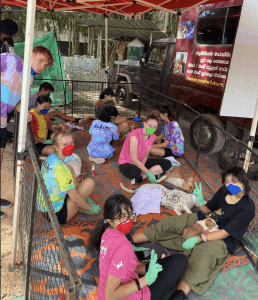
Our service group definitely worked collaboratively to do this sterilization camp. We all worked together to help out the dogs – some people gave the dogs the IV, others the tick medicine, others gave them love and attention, others looked after the puppies, others calmed them down, others took photos and others made sure the puppies were breathing alright. We each took on individual roles to help care for the dogs, and make it the most pleasant experience possible. A little one-eyed dog called Stitch was even adopted by a member! There were so many benefits of working collaboratively. Every job that needed to get done got done

because there were so many people helping out. Everything ran smoothly and we all helped each other and worked really well. Some challenges of the collaboration were a difference in opinion about what is right for the dogs (how long after the surgery to give food, when to take out the IV, etc). However, with help and assistance from professional vets, these challenges were quickly overcome.
LO7 Recognize and consider the ethics of choices and actions Students show awareness of the consequences of choices and actions in planning and carrying out CAS experiences.

This is a huge part of the sterilization camp, as there are massive ethical implications and different potential opinions on sterilizing animals. The ethics of sterilizing street dogs and cats is debatable because it sounds quite chauvinistic and superior to have the mindset that the dog population (which is significantly lower than the human population) must be controlled. After a dog/cat is vaccinated, they can no longer have children. These are the consequences and implications of doing a sterilization camp. However, it is morally ethical to do a sterilization camp in Sri Lanka specifically. This is because, in 2012, there was an abundance of rabies cases in Sri Lanka, and the government decided that the solution to rabies cases was to kill the dogs. Over 3 million stray dogs were killed to avoid humans getting rabies, but animal-rights protesters argued with the government and suggested a sterilization program to reduce the street dog population without murder. Sterilization camps were the compromise to this situation. It is also useful to have a smaller dog population because it means there are more people to look after, feed and care for each dog. The sterilization process is also beneficial to the health of the dogs; giving them vaccines against viruses, and help prevent cancers.